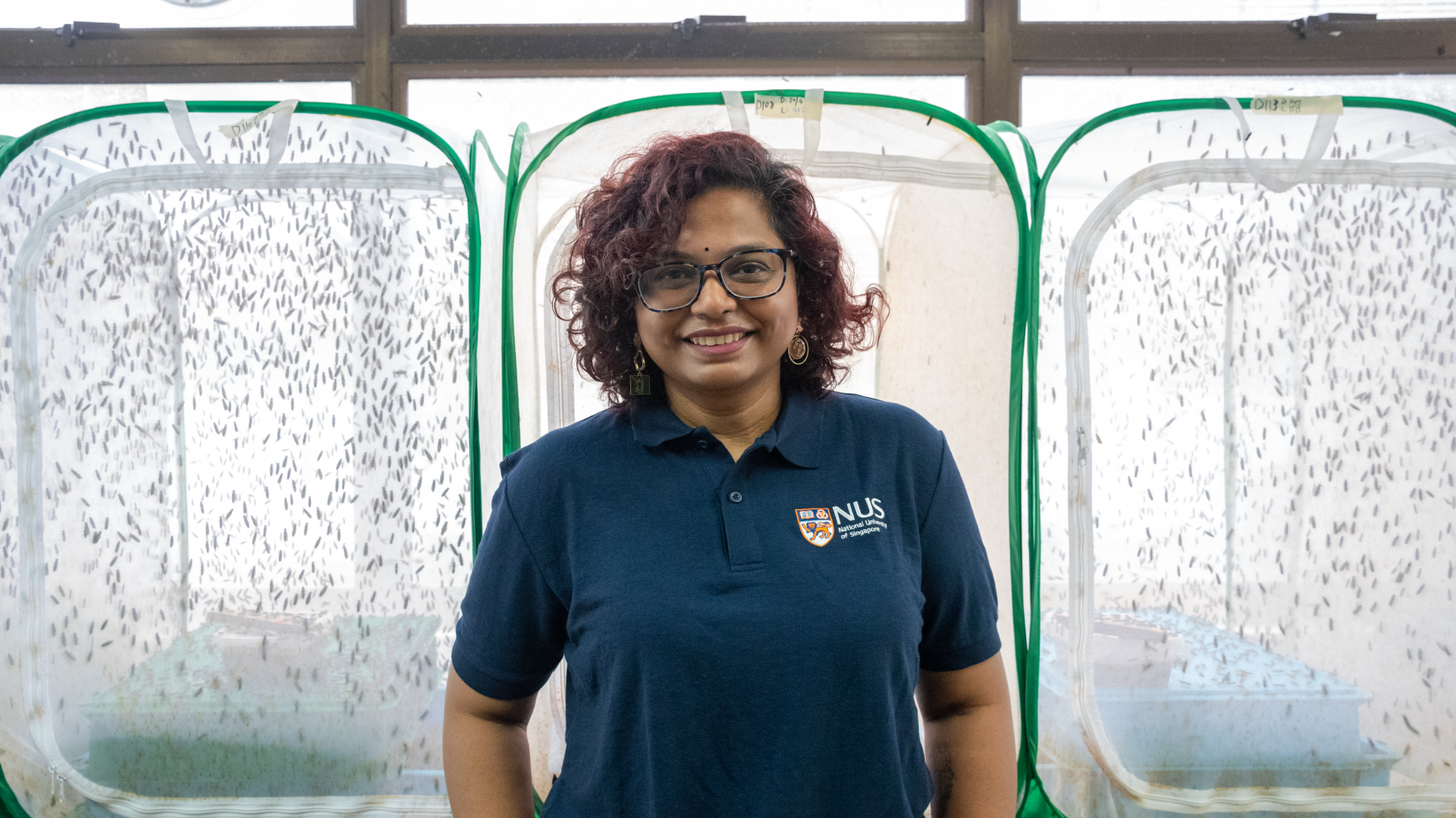Solving complex problems with the help of insects
Assistant Professor Nalini Puniamoorthy is very interested in the private lives of insects, especially how they reproduce.
In a research facility at Block S4A on NUS Kent Ridge campus stand neat rows of what look like oversized laundry hampers. Within their gossamer-thin white fabric walls, however, are not clothes, but hundreds of thousands of black soldier flies. These common flies that can be found all over Singapore hold a key to solving the island-state’s food waste problem.
Asst Prof Puniamoorthy notes that less than one-fifth of Singapore’s total annual food waste – which the National Environment Agency estimates to be about 700,000 tonnes – is recycled. That is where these “natural recycler” black soldier flies and their larvae come in. The larvae break down the food waste and in return, produce fertiliser and animal feed in a process called food waste valorisation.
Part of Asst Prof Puniamoorthy’s research is trying to improve the reproduction of these black soldier flies so that they can breed in smaller spaces. Or as she puts it, “Build-To-Order flats for flies”. The eventual aim is to have them breed in small cages that can be stacked up to save space.
“We take black soldier flies that are wild-caught from Singapore – so these are native flies – and we breed them with other commercial strains that have good traits. So, their young will eventually possess outstanding traits, for instance with increased fertility,” she explained.
These slender flies, together with other insects such as mosquitoes and dung beetles, hold strong fascination for Asst Prof Puniamoorthy, whose current research seeks to understand the role that reproduction plays in establishing barriers to gene flow among populations and species, specifically in insect models.
Simply put, she is looking at how insects’ reproductive traits have evolved over time and what impact that has for the future of the species.
Fascination with biology
Asst Prof Puniamoorthy got her start in the world of science during her secondary school days when she had to collect sugar cane fibres from hawker centres, and make ethanol out of them in a literal backyard experiment.
From that school project blossomed a love for science, particularly in biology. She recalls being fascinated with blood groups; how her family members were of different blood groups despite them being related.
Genetics and inheritance of traits confounded her for ages, and got her started down a road that eventually led her to a career as an evolutionary biologist, figuring out the twisty biological pathways that nature can take.
“A biologist is like Sherlock Holmes, trying to figure out how things happen. We often ask why is something a certain way. And with biology, it's in our genes. It's how our genes interact with the environment. I'm interested to know how genetic changes accumulate and how they can just vary over time,” Asst Prof Puniamoorthy shared.
Many think that evolution involves drastic, big changes. But to her, smaller changes are also fascinating because anything that results in a change in one’s genetic composition, and accumulation of genetic variation, is evolution.
She joined NUS as an undergraduate student in August 2002, surfing the biomedical wave that was going on then. She was also in the University Scholars Programme, where she studied a module on evolution. That module was her ‘eureka!’ moment, as it helped her draw the links between all facets of biology. She also signed up for the Undergraduate Research Opportunities Programme in Science, where she joined a lab that investigated the evolution of traits in insects.
She recalled, “That was the first time I realised you don't have to be asking the same question that everybody is asking. Why not ask questions that other people have not thought about?”
Global research experience
Her research eventually took her across the globe, to countries like Germany, Switzerland, Sweden, Italy as well as Costa Rica, Panama and the United States.
Her most unforgettable experience was her time in Panama, where she had to trek through densely forested terrain to conduct her experiments. She worked on the Barro Colorado Island located in the Panama Canal, in a research facility run by the Smithsonian Tropical Research Institute, where she studied how insect populations on islands that are isolated from the mainland can evolve behavioural traits that can act as barriers to gene flow.
The best part is that her rich research experience accumulated from all over the world is relevant and transferrable to Singapore.
Much like the evolution of the insects she studies, the next stage of her journey involves her tackling local challenges.
“What I'm trying to do as a Singaporean is to contribute back to research that comes out of Singapore, but which has global implications. There's a lot in our backyard. We don't realise just how biodiverse Singapore is, and this is why we need to protect every piece that we have left,” she said.





